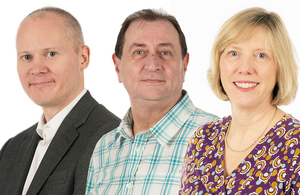Dstl tackles tech skills shortage
A pilot work placement scheme to encourage talented science and technology (S&T) experts to return to work has been hailed a huge success by the Defence Science and Technology Laboratory (Dstl).

Dstl STEM Returners: Giles Moore, Tom Shuttleworth and Ann Stanhope
Dstl has been running a 12-week STEM returners programme aimed at giving experienced science, technology, engineering and maths (STEM) professionals the confidence to step back in to their careers after taking time away.
Those involved have been working on challenging projects; in areas including cyber, information systems and defence and security analysis. Placements were also provided with the Defence and Security Accelerator (DASA), which finds and funds innovative projects from a £800 million Defence Innovation fund.
Helen Christie, one of Dstl’s Talent Acquisition and Planning Advisers, said:
The skill set attracted has been excellent. It’s been brilliant to be able to help people who thought their technical expertise might never be used again in a workplace environment. Dstl is committed to a flexible supportive workplace so that people of all backgrounds and situations can succeed here and contribute to providing world-leading science and technology. The success of the 2018 STEM returners programme is definitely something we will be building on and therefore hope to run a similar programme next year. We are also encouraged by the positive experience expressed by each returner and we now hope that those involved will have the confidence to apply for a permanent role at Dstl.
STEM Returner, Tom Shuttleworth, has been working in the Physical Science Group within Dstl’s Platform Systems Division, said:
After taking voluntary redundancy from my previous employment I was considering early retirement, however for various reasons and boredom, it became apparent I needed to have a level of stimulation back. When I was offered a place on the STEM returners open day at Dstl, I jumped at the chance and was delighted when I was offered a placement. My role has been varied and challenging and involved producing a vital guidance document on the management of restricted materials. It’s been a fantastic experience and I would definitely recommend this kind of programme to others who have been out the work place for some time.
Ann Stanhope secured a place as a STEM Returner in the Support Services team with DASA, said:
I left a career in the semiconductor industry 20 years ago and wanted to get back in touch with technology. Working with DASA has been a very positive experience – I’ve learnt a lot about how the organisation works, carrying out a variety of tasks, some harder than others. The STEM Returners programme is very well run and dedicated to finding opportunities for people with different backgrounds.
STEM Returner Giles Moore has been working in Dstl’s Strategic Systems Group, and said:
My team leader gave me time to explore the organisation’s systems, build new relationships and come up with ideas of how I could contribute. I also had the opportunity to present my thoughts to the team halfway through my placement. I thought the best way to contribute was to work on knowledge-graph development because subject matter experts are always too busy to work on that sort of thing, and I think it’s important. It’s been a great experience.
Dstl is also leading the STEM Futures consortium and actively supports the STEM Returners programme, with both organisations having an overall intent to develop talent and enhance the S&T workforce.
Natalie Desty, Founder of STEM Returners said:
It has been a real pleasure to work with Dstl on this programme. Right from the outset Dstl recognised the huge value that returners had to offer and provided fantastic support and training to ensure their success. Returners find the barriers to return often insurmountable through standard recruitment channels, Dstl’s open minded, flexible and inclusive approach has successfully restarted careers and brought back valuable lost skills to the industry.